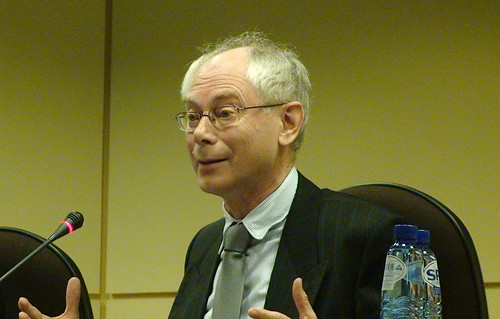 Representatives from the P5+1 met on Friday in response to Iran’s rejection of the uranium enrichment proposal earlier this week. In a joint statement released at the conclusion of the meeting, the P5+1 “urge[d] Iran to reconsider the opportunity offered by this agreement, and to engage seriously with us in dialogue and negotiations.” U.S. President Barack Obama will likely push for sanctions against Iran in the coming weeks. He elicited a bland but significant statement of support from Russian President Dmitry Medvedev on Sunday in Singapore but failed to win a similar statement from Chinese President Hu Jintao during Obama’s nine-day tour in Asia. A senior EU official confirmed that sanctions were discussed at the meeting but not in specific, actionable terms. Mohamed ElBaradei, the director general of the UN International Atomic Energy Agency (IAEA), suggested that Iran’s Wednesday announcement should not necessarily be considered that nation’s final, written decision. “What I got is an oral response [from Tehran], basically saying we need to keep all the material in Iran until we get the fuel [rods].” Dr. ElBaradei lamented, “I would hate to see that we are moving back to sanctions because…sanctions are going to make things much worse.”
Representatives from the P5+1 met on Friday in response to Iran’s rejection of the uranium enrichment proposal earlier this week. In a joint statement released at the conclusion of the meeting, the P5+1 “urge[d] Iran to reconsider the opportunity offered by this agreement, and to engage seriously with us in dialogue and negotiations.” U.S. President Barack Obama will likely push for sanctions against Iran in the coming weeks. He elicited a bland but significant statement of support from Russian President Dmitry Medvedev on Sunday in Singapore but failed to win a similar statement from Chinese President Hu Jintao during Obama’s nine-day tour in Asia. A senior EU official confirmed that sanctions were discussed at the meeting but not in specific, actionable terms. Mohamed ElBaradei, the director general of the UN International Atomic Energy Agency (IAEA), suggested that Iran’s Wednesday announcement should not necessarily be considered that nation’s final, written decision. “What I got is an oral response [from Tehran], basically saying we need to keep all the material in Iran until we get the fuel [rods].” Dr. ElBaradei lamented, “I would hate to see that we are moving back to sanctions because…sanctions are going to make things much worse.”
South Korean officials indicated Friday that they will not renegotiate its free trade agreement (FTA) with the United States signed in June 2007. Some U.S. officials and members of Congress believe the FTA, which is yet to be ratified, does not sufficiently balance South Korea’s $13 billion trade surplus, especially in the automotive industry. South Korea exports nearly 100 times the number of vehicles to the United States that it imports from American auto manufacturers. President Lee Myung-bak, welcoming President Obama to Seoul on Thursday, suggested he was willing to hear U.S. complaints about the agreement, which became a heated point of debate during the U.S. presidential elections and in Congress. “There’s a tendency to lump all of Asia together when Congress looks at trade agreements and says it appears this is a one-way street,” said Obama, in conciliatory remarks. On Friday, Korean Foreign Minister Yu Myung-hwan emphasized that President Lee’s comments did not offer “renegotiation.” The Korea Institute for International Economic Policy estimated the FTA would boost South Korea’s long-term growth by 6 percent, creating 340,000 jobs; similarly, the U.S. Chamber of Commerce estimated the FTA would create 350,000 American jobs. Also on Friday, South Korea announced plans to ease rules on domestic investment and foreign entry, in hopes of dramatically increasing tourism and foreign investment.
The Chinese government came under scrutiny Thursday after secret scholarships awarded to children of Namibian officials were revealed. According to The New York Times, scholarships to study in China were given to the children of nine top Namibian officials, including the defense minister and President Hifikepunye Pohamba. First revealed by the Namibian tabloid Informante, the scholarship scandal unleashed a wave of fury from civil society groups and youth organizations, who say that it is unconscionable for well-paid officials to accept the scholarships while only one out of six high school graduates in Namibia is able to attend college. “Only senior people in government knew about the scholarships,” said Norman Tjombe, director of the nonprofit Legal Assistance Center. “No chance was given at all to the general public.” The budding relationship between China and Namibia, cemented through lucrative development deals, is already under scrutiny by Namibian prosecutors, and many now wonder if the scholarships are merely a Chinese attempt to buy influence from Namibia’s leadership to win more contracts for its companies that seek to do business there. “How is it that this favor just comes like manna from heaven?” Elijan Nguare, secretary general of Namibian governing party Swapo’s youth league, told The New York Times. “Clearly there must be something that they are after.” Government agencies in China have not commented as of this writing, but Namibia’s anti-corruption commission began an inquiry into how the scholarships were awarded.